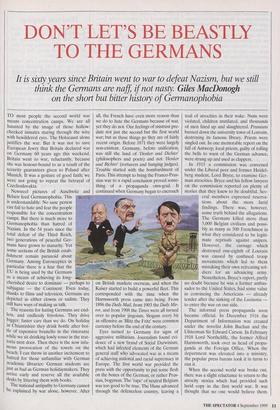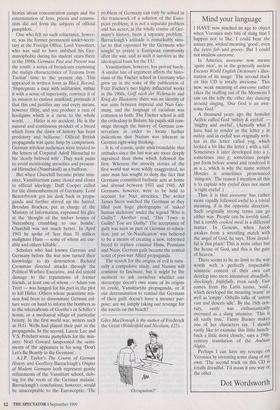DON'T LET'S BE BEASTLY TO THE GERMANS
It is sixty years since Britain went to war to defeat Nazism, but we still
think the Germans are naff, if not nasty. Giles MacDonogh
on the short but bitter history of Germanophobia
TO most people the second world war means concentration camps. We are all haunted by the image of those hollow- checked inmates staring through the wire with bewildered eyes. The Holocaust alone justifies the war. But it was not to save European Jewry that Britain declared war on Germany 60 years ago this weekend. Britain went to war, reluctantly, because she was honour-bound to as a result of the security guarantees given to Poland after Munich. It was a gesture of good faith; we were not going to repeat the betrayal of Czechoslovakia.
Newsreel pictures of Auschwitz and B. elsen feed Germanophobia. This is understandable. No sane person can fail to hate and fear the people responsible for the concentration camps. But there is much more to Germanophobia than hatred of Nazism. In the 54 years since the total defeat of the Third Reich, two generations of peaceful Ger- mans have grown to maturity. Yet some sections of the British estab- lishment remain paranoid about Germany. Among Eurosceptics in particular there is a fear that the EU is being used by the Germans as a means of achieving its long- cherished desire to dominate — perhaps to subjugate — the Continent. Even today, thanks to films and television, Germans are depicted as either clowns or sadists. They still have ways of making us talk.
The reasons for hating Germans are end- less, and endlessly frivolous. They drive bigger, faster cars than we do. On holiday in Chiantishire they drink bottle after bot- tle of expensive brunello in the ristorante while we sit drinking lowly rosso in the trat- toria next door. Then there is the now infa- mous provocation of the towels on the beach. 1 can throw in another incitement to hatred for those unfamiliar with German academic libraries: German students are Just as bad as German holidaymakers. They arrive early and reserve all the available desks by littering them with books. The national antipathy to Germany cannot be explained by war alone, however. After
all, the French have even more reason than we do to hate the Germans because of war, yet they do not. Our feelings of mistrust pre- date not just the second but the first world war; but as these things go they are of fairly recent origin. Before 1871 they were largely non-existent. Germany, before unification, was still the land of Denlcer und Dichter' (philosophers and poets) and not Ilenker und Richter' (torturers and hanging judges). Trouble started with the bombardment of Paris. This attempt to bring the Franco-Prus- sian war to a rapid conclusion proved some- thing of a propaganda own-goal. It continued when Germany began to encroach on British markets overseas, and when the Kaiser started to build a powerful fleet. This corresponded with the time when the Harmsworth press came into being. From 1896 the Daily Mail, from 1903 the Daily Mir- ror, and from 1908 the Times were all turned over to popular jingoism. Slogans every bit as offensive as 'Blitz the Fritz' were common currency before the end of the century.
Eyes turned to Germany for signs of aggressive militarism. Journalists found evi- dence of a new brand of Social Darwinism, which had infected elements of the German general staff who advocated war as a means of achieving national and racial supremacy in Europe. The first world war provided the press with the opportunity to put some flesh on the bones of the German, or rather Prus- sian, bogyman. The 'rape' of neutral Belgium was too good to be true. The Huns advanced through the defenceless country, leaving a
trail of atrocities in their wake. Nuns were violated, children mutilated, and thousands of men lined up and slaughtered. Prussians burned down the university town of Louvain, destroying its famous library. Priests were singled out. In one memorable report on the fall of Antwerp, local priests, guilty of tolling the bells to warn of the German advance, were strung up and used as clappers.
The informal press propaganda soon became official. In December 1916 the Department of Information was created under the novelist John Buchan and the Ulsterman Sir Edward Carson. In February 1918 Lord Northcliffe, the former Alfred Harmsworth, took over as head of propa- ganda at the Foreign Office. When the department was elevated into a ministry, the popular press barons took it in turns to run it.
When the second world war broke out, there was a slight reluctance to return to the atrocity stories which had provided such lurid copy in the first world war. It was thought that no one would believe them. Stories about concentration camps and the extermination of Jews, priests and commu- nists did not form the subjects of official pamphlets.
One who felt no such reluctance, howev- er, was the former permanent under-secre- tary at the Foreign Office, Lord Vansittart, who was said to have imbibed his Ger- manophobia during his student years there in the 1890s. Germans Past and Present was the result: a series of broadcasts examining the malign characteristics of Teutons from Tacitus' time to the present day. This appeared in written form as Black Record: `Impregnate a race with militarism, imbue it with a sense of superiority, convince it of its mission to enslave mankind, persuade it that this end justifies any and every means, however filthy, and you produce a race of hooligans which is a curse to the whole world. . .. Hitler is no accident. He is the natural and continuous product of a breed which from the dawn of history has been predatory and bellicose.' Official British propaganda was quite limp by comparison. German wireless audiences were treated to the letters of Corporal Adolf Hirnschal to his 'dearly beloved wife'. They took pains to avoid mentioning atrocities and present- ed Hirnschal (Numbskull) as a buffoon.
But when Churchill became prime min- ister, Vansittartism came closer and closer to official ideology. Duff Cooper called for the dismemberment of Germany. Lord Beaverbrook got his desk back in propa- ganda and further stirred up the hatred. Brendan Bracken, put in charge of the Ministry of Information, expressed his glee at the 'thought of the timber houses of Nuremberg crumbling to our bombs'. Churchill was not much better. In April 1941 he spoke of 'less than 70 million malignant Huns — some of whom are cur- able and others killable'.
Scholars who had known German and Germany before the war now turned their knowledge to its destruction. Richard Crossman directed attacks through the Political Warfare Executive, and did untold damage to the reputations of former friends, at least one of whom — Adam von Trott — was hanged for his part in the plot to kill Hitler. Others whose peacetime mis- sion had been to disseminate German cul- ture were on hand to inform the bombers as to the whereabouts of Goethe's or Schiller's house, or a mediaeval village of particular beauty. In the first world war, writers such as H.G. Wells had played their part in the propaganda. In the second, Laurie Lee and V.S. Pritchett wrote pamphlets for the min- istry. Noel Coward lampooned the senti- ments of the appeasers in his song 'Don't Let's Be Beastly to the Germans'.
A.J.P. Taylor's The Course of German History and Geoffrey Barraclough's Origins of Modern Germany both represent gentle refinements of the Vansittart school, delv- ing for the roots of the German malaise. Barraclough's conclusions, however, would be unacceptable to the Eurosceptic: 'The problem of Germany can only be solved in the framework of a solution of the Euro- pean problem; it is not a separate problem and has never, in the whole course of Ger- many's history, been a separate problem.' Barraclough's attitude is remarkably simi- lar to that espoused by the Germans who sought to create a European community after the war, and as such it survives as the ideological basis for the EU.
Vansittartism, however, has proved hardy. A similar line of argument affects the histo- rians of the Fischer school in Germany who grew up in the wake of the publication of Fritz Fischer's two highly influential works in the 1960s, Griff nach der Weltmacht and Krieg der Illusionen: there was an identity of war aims between imperial and Nazi Ger- many, and the language of racialism was common to both. The Fischer school is still the orthodoxy in Britain: his pupils still rum- mage through the history of German con- servatism in order to locate further indications that Nazism was inherent in German right-wing thinking.
It is, of course, quite understandable that attitudes since the last war are more deeply ingrained than those which followed the first. Whereas the atrocity stories of the first world war were wildly exaggerated, no sane man has sought to deny the fact that Germans committed barbaric acts at home and abroad between 1933 and 1945. All Germans, however, were to be held to account for Nazi atrocities. The writer James Stern watched the Germans as they filed past huge photographs of 'naked human skeletons' under the legend 'Who is Guilty?' Another read, 'This Town is Guilty! You are Guilty!' The acceptance of guilt was seen as part of German re-educa- tion, just as `de-Nazification' was believed to be a means of creating a new, reformed breed to replace criminal Huns, Prussians and Nazis. German guilt became the central tenet of post-war Allied propaganda.
The search for the origins of evil is natu- rally a compulsive study, and Nazism will continue to fascinate, but it might be the moment to ask ourselves whether our stereotype doesn't owe some of its origins to crude, Vansittartite propaganda, or if our determination to remind the Germans of their guilt doesn't have a meaner pur- pose: are we simply taking our revenge for the towels on the beach?
Giles MacDonogh is the author of Frederick the Great (Weidenfeld and Nicolson, £25).
`Occupation?'



























































 Previous page
Previous page